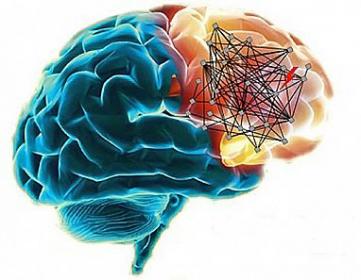The Genetics of Alzheimer's Disease and Frontotemporal Disorders
The Genetics of Alzheimer's Disease
Most cases of Alzheimer’s disease-type dementia result from a mix of genetic, environmental and lifestyle factors. Overall, 65 year olds have a 10 percent risk of developing symptoms. In other words, 1 in 10 people over age 65 will develop it, and those who reach 85 or older, the rate rises to 1 in 3. That level of risk varies in subtle ways across individuals. About 20 gene variants are known to confer low levels of increased risk for late-onset Alzheimer’s disease, while others endow resilience.
Some cases of Alzheimer's disease, and other neurodegenerative diseases such as frontotemporal dementia, are caused by a genetic mutation, or permanent change in one or more specific genes. About 3% of Alzheimer cases are ‘familial,’ or caused by single mutations inherited from a parent. Familial Alzheimer's disease usually onsets before age 65. Read on to learn about the genetic differences between early- and late-onset Alzheimer's disease, and frontotemporal degeneration (FTD).
Identifying genetic variants may help researchers find the most effective ways to treat or prevent diseases such as Alzheimer's or frontotemporal degeneration in an individual. This approach, called precision medicine, takes into account individual variability in genes, environment, and lifestyle for each person.
Late-Onset Alzheimer’s Disease Genetics
* Adapted from the National Institute on Aging: Alzheimer's Education and Referral Center
Most people with Alzheimer's have the late-onset form of the disease, in which symptoms become apparent in the mid-60s and later. The causes of late-onset Alzheimer's are not yet completely understood, but they likely include a combination of genetic, environmental, and lifestyle factors that affect a person's risk for developing the disease.
Researchers have not found a specific gene that directly causes the late-onset form of the disease. However, having a particular version of the apolipoprotein E (APOE) gene on chromosome 19—does increase risk, but only for people of European ancestry. APOE comes in several different forms, or alleles:
APOE ε2 is relatively rare and may provide some protection against the disease. If Alzheimer's disease occurs in a person with this allele, it usually develops later in life than it would in someone with the APOE ε4 gene. Among the general population, about 8 percent of people have APOE2.
APOE ε3, the most common allele, present in more than half of the general population, neither decreases nor increases risk. Among the general population, 78 percent have APOE3.
APOE ε4 increases risk for late-onset Alzheimer's disease and is also associated with an earlier age of disease onset. Only 14 percent of people in the general population have APOE4, but 37% of people with late-onset Alzheimer's disease carry this version of the gene. A person can have zero, one, or two APOE ε4 alleles. Having one APOE ε4 alleles increases the risk of developing Alzheimer's by 3 to 4 times, and two copies of APOE-ε4 (one from each parent) raises the risk by more than 10 times. However, inheriting an APOE ε4 allele does not mean that a person will definitely develop Alzheimer's. Some people with an APOE ε4 allele never get the disease, and others who develop Alzheimer's do not have any APOE ε4 alleles.
Using an approach called genome-wide association study (GWAS), researchers have identified a number of regions of interest in the genome (an organism's complete set of DNA, including all of its genes) that may increase a person's risk for late-onset Alzheimer's to varying degrees. They have confirmed about 20 gene variants that seem to slightly raise Alzheimer's risk after age 65.
Early-Onset Alzheimer's Disease Genetics
Early-onset Alzheimer’s disease, a relative rare condition, occurs between a person’s 30s to mid-60s. About 3% of Alzheimer's disease cases are caused by an inherited change in a gene, resulting in a type known as early-onset familial Alzheimer’s disease, or eFAD.
A child whose biological mother or father carries a genetic mutation for eFAD has a 50/50 chance of inheriting that mutation. If the mutation is in fact inherited, the child has a very strong probability of developing eFAD.
Genetics researchers have studied eFAD families to discover the three known genes that cause familial Alzheimer's disease: amyloid precursor protein (APP) on chromosome 21, presenilin-1 (PS1) on chromosome 14, and presenilin-2 (PS2) on chromosome 1. Of these, PS1 mutations account for most eFAD. Having a pathogenic mutation in one of these three genes virtually guarantees that one will develop early onset Alzheimer's disease. Additional genes are waiting to be discovered in eFAD families.
In fact, UW ADRC researchers made some of the first contributions to the field of Alzheimer's and non-Alzheimer's disease genetics in the 1990s, with research leading to key discoveries of the presenilin (PS) mutations.
- Read about the ADRC's identification of the PSEN2 N141I mutation in a family from Russia’s Volga River region, which led to their realization in 2010 that the original patient with Alzheimer's disease (Auguste D.) lived in this same region of Germany and probably carried this PS2 mutation.
NIA-supported scientists, including at the ADRC, are continuing research into early-onset disease through the Dominantly Inherited Alzheimer Network (led by the Washington University School of Medicine at St. Louis) the first prevention trial for Autosomal Dominant Alzheimer’s Disease (ADAD) families, through an international research partnership. By observing the Alzheimer's-related brain changes that occur in these families long before symptoms of memory loss or cognitive issues appear, scientists hope to gain insight into how and why the disease develops in both its early- and late-onset forms.
- NIA's Early-Onset Alzheimer's Disease: A Resource List.
- Download the Alzheimer's Genetics Fact Sheet
Frontotemporal Disorders Genetics
Frontotemporal lobar degeneration (FTLD) comprises several different progressive neurological disorders that affect cognition, behavior, and/or language, and lead to dementia. These include behavioral variant frontotemporal dementia (FTD), semantic dementia, primary progressive aphasia, and FTD-motor neuron disease. In about 15 to 40 percent of people, a genetic (hereditary) cause can be identified. Individuals with a family history of frontotemporal disorders are more likely to have a genetic form of the disease than those without such a history. Scientists have discovered several different genes that, when mutated, can lead to frontotemporal disorders:
MAPT gene—A mutation in this gene causes abnormalities in a protein called tau, which forms tangles inside neurons and ultimately leads to the destruction of brain cells. Inheriting a mutation in this gene means a person will almost surely develop a frontotemporal disorder, usually bvFTD, but the exact age of onset and symptoms cannot be predicted.
PGRN gene—A mutation in this gene can lead to lower production of the protein progranulin, which in turn causes TDP-43, a cellular protein, to go awry in brain cells. Many frontotemporal disorders can result, though bvFTD is the most common. The PGRN gene can cause different symptoms in different family members and cause the disease to begin at different ages.
C9ORF72 gene—A mutation in this gene appears to be the most common genetic abnormality in people with behavioral frontotemporal disorders and familial ALS. This mutation can cause a frontotemporal disorder, ALS, or symptoms of both conditions in a person or within a family.
VCP, CHMP2B, TARDBP, and FUS genes—Mutations in these genes lead to very rare familial types of frontotemporal disorders.
If you or your family has a question about genetic testing for familial neurodegenerative disease, please talk to your doctor about finding a qualified genetic counselor.
More information sources:
- AlzForum: What Is Early Onset Familial Alzheimer Disease (eFAD)?
- Read our article, Dr. John Ravits Gives an Encouraging Update on Genetic FTD/ALS Treatment
- The Association for Frontotemporal Degeneration offers unparalled resources and information tailored to families and individuals experiencing FTD.





